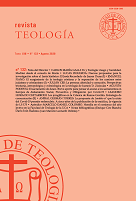El surgimiento de la teología cristiana y la separación de los caminos entre judaísmo y cristianismo (I)
DOI:
https://doi.org/10.46553/teo.57.132.2020.p63-86Palabras clave:
Controversias trinitarias, Judaísmo, Cristianismo, Nicea, RabinismoResumen
A través del presente artículo en dos partes me propongo emprender un examen del papel que las controversias trinitarias del cuarto siglo jugaron en determinar el alejamiento entre judíos y cristianos en la Antigüedad tardía. Este ensayo propone que nuevas particiones surgieron dentro de lo que podríamos llamar el continuum cristiano-judío, gracias a las novedosas prácticas intelectuales desarrolladas por los cristianos durante esos debates para expresar sus ideas sobre Dios. Desde el punto de vista del contenido teológico, las disputas trinitarias permanecieron dentro del continuum de judaísmo y cristianismo: ninguna de las opciones teológicas exploradas por los cristianos habría sido fuente de particular escándalo para un
judío contemporáneo a raíz de su particular articulación de lo divino. Sin embargo, al abandonar algunos modos argumentativos que oficiaban de puentes entre discursos protorabínicos y protocristianos, la producción de un campo teológico por parte de los creyentes en Jesús determinó que cristianismo y judaísmo se constituyan en tradiciones intelectuales diferenciadas.
Descargas
Citas
Abramowski, Luise. “Trinitarische und christologische Hypostasenformeln”, Theologie und Philosophie 54 (1979): 38-49.
Ayres, Lewis. Nicaea and Its Legacy: An Approach to Fourth-Century Trinitarian Theology. Oxford: Oxford University Press, 2004.
___. “A Response to the Critics of Nicaea and Its Legacy”, The Harvard Theological Review 100 (2007): 159-171.
___.“Nicaea and Its Legacy: An Introduction”, The Harvard Theological Review 100 (2007): 141-144.
Ayres, Lewis and Andrew Radde-Gallwitz. “Doctrine of God.” Páginas 864-885 en The Oxford Handbook of Early Christian Studies. Ed. Susan Ashbrook Harvey and David G. Hunter. Oxford: Oxford University Press, 2008.
Barnes, Michel René. “De Régnon Reconsidered”, Augustinian Studies 26 (1995): 51-79.
___. “One Nature, One Power: Consensus Doctrine in Pro-Nicene Polemic”. Páginas 205-223 en Studia Patristica XXIX. Historica, Theologica et Philosophica, Critica et Philologica. Papers Presented at the Twelfth International Conference on Patristic Studies Held in Oxford 1995. Ed. Elizabeth Anne Livingstone. Louvain: Peeters, 1997.
Beckwith, Carl L. Review of Lewis Ayres, Nicaea and Its Legacy. An Approach to Fourth-Century Trinitarian Theology. Journal of Early Christian Studies 13 (2005): 398-400.
Beeley, Christopher. “Divine Causality and the Monarchy of God the Father in Gregory of Nazianzus”, The Harvard Theological Review 100 (2007): 199-214.
Behr, John. “The Question of Nicene Orthodoxy”. Páginas 15-27 en Byzantine Orthodoxies: Papers from the Thirty-sixth Spring Symposium of Byzantine Studies, University of Durham, 23-25 March 2002. Ed. Augustine M.C. Casiday and Andrew Louth. Society
for the Promotion of Byzantine Studies Publications 12. Aldershot: Ashgate, 2006.
Behr, John. “Response to Ayres: The Legacies of Nicaea, East and West”, The Harvard Theological Review 100 (2007): 145-152.
Boyarin, Daniel. “The Gospel of the Memra: Jewish Binitarianism and the Prologue to John”, The Harvard Theological Review 94 (2001): 243-284.
___. “Semantic Differences; Or, ‘Judaism’/’Christianity’”. Páginas 65-85 en The Ways that Never Parted: Jews and Christians in Late Antiquity and the Early Middle Ages. Ed. Adam H. Becker and Annette Yoshiko Reed. Tübingen: Mohr Siebeck, 2003.
___. “Rethinking Jewish Christianity. An Argument for Dismantling a Dubious Category (to which Is Appended a Correction of My Border Lines)”, The Jewish Quarterly Review 99 (2009): 7-36.
___. “Beyond Judaisms. Meṭaṭron and the Divine Polymorphy of Ancient Judaism”, Journal for the Study of Judaism in the Persian, Hellenistic, and Roman Period 41 (2010): 323-365.
Brennecke, Hanns Christof. “Erwägungen zu den Anfängen des Neunizänismus”. Páginas 241-257 en Oecumenica et Patristica: Festschrift für Wilhelm Schneemelcher zum 75. Geburtstag. Ed. Damaskinos Papandreou, Wolfgang A. Bienert, and Knut Schäferdiek. Stuttgart: Kohlhammer, 1989.
Brennecke, Hanns Christof, Uta Heil, Annette von Stockhausen, and Angelika Wintjies. Athanasius Werke. Dritter Band. Erster Teil. 3. Lieferung. Berlin and New York: De Gruyter, 2007.
Bucur, Bogdan. “‘Early Christian Binitarianism’: From Religious Phenomenon to Polemical Insult to Scholarly Concept”, Modern Theology 27 (2011): 102-120.
Burrus, Virginia. Begotten, not Made: Conceiving Manhood in Late Antiquity. Stanford (CA): Stanford University Press, 2000.
___. “Hailing Zenobia: Anti-Judaism, Trinitarianism, and John Henry Newman”, Culture and Religion: An Interdisciplinary Journal 3 (2002): 163-177.
Cameron, Avil. “Jews and Heretics: A Category Error?” Páginas 345-360 en The Ways that Never Parted: Jews and Christians in Late Antiquity and the Early Middle Ages. Ed. Adam H. Becker and Annette Yoshiko Reed. Tübingen: Mohr Siebeck, 2003.
Cantalaessa, Raniero, Joseph T. Lienhard, and Jason M. Quigley, eds. Easter in the Early Church: An Anthology of Jewish and Early Christian Texts. Collegeville (MN): Liturgical Press, 1993.
Capes, David B, ed. Israel’s God and Rebecca’s Children: Christology and Community in Early Judaism and Christianity. Essays in Honor of Larry W. Hurtado and Alan F. Segal. Waco (TX): Baylor University Press, 2007.
Carleton Paget, James Nicholas. “Anti-Judaism and Early Christian Identity”. Zeitschrift für Antikes Christentum 1 (1997): 195-225.
___. “Jewish Christianity”, Páginas 731-775 en The Cambridge History of Judaism. Vol. III: The Early Roman Period. Ed. William Horbury, W.D. Davies, and John Sturdy. Cambridge: Cambridge University Press, 1999.
___. “The Definition of the Terms Jewish Christian and Jewish Christianity in the History of Research”. Páginas 22-52 en Jewish Believers in Jesus: The Early Centuries. Ed. Reidar Hvalvik and Oskar Skarsaune. Peabody: Hendrickson Publisher, 2007.
Cavallera, Ferdinand. Le schisme d’Antioche (IVe et Ve siècle). Paris: Alphonse Picard et fils, 1905.
Coakley, Sarah. “Re-thinking Gregory of Nyssa: Introduction— Gender, Trinitarian Analogies, and the Pedagogy of The Song”, Modern Theology 18 (2002): 431-443.
___. “Introduction: Disputed Questions in Patristic Trinitarianism”, The Harvard Theological Review 100 (2007): 125-138.
Crone, Patricia. “Jewish Christianity and the Qurʾān (Part One)”, Journal of Near Eastern Studies 74 (2015): 225-253.
___. “Jewish Christianity and The Qurʾān (Part Two)”, Journal of Near Eastern studies 75 (2016): 1-21.
Daley, Brian E. “Christ and Christologies”. Páginas 886-905 en The Oxford Handbook of Early Christian Studies. Ed. Susan Ashbrook Harvey and David G. Hunter. Oxford: Oxford University Press, 2008.
Daunoy, Fernard. “La question pascale au Concile de Nicée”, Échos d’Orient 24 (1925): 424-444.
de Halleux, André. “‘Hypostase’ et ‘Personne’ dans la formation du dogme trinitaire (ca 375-381)”, Revue d’histoire ecclésiastique 79 (1984): 311-369 and 623-670 [= Páginas 113-214 en André de Halleux. Patrologie et oecuménisme : recueil d’études. Bibliotheca Ephemeridum theologicarum Lovaniensium 93. Louvain: Louvain University Press, 1990].
de Régnon, Théodore. Études de théologie positive sur la Sainte Trinité. Paris: Victor Retaux, 1892.
DelCogliano, Mark. “The Promotion of the Constantinian Agenda in Eusebius of Caesarea’s ‘On the Feast of Pascha’”. Páginas 39-68 en Reconsidering Eusebius: Collected Papers on Literary, Historical and Theological Issues. Ed. Sabrina Inowlocki and Claudio Zamagni.
Vigiliae Chrisitanae Supplements 107. Leiden: Brill, 2011.
Dinsen, Frauke. Homoousios: die Geschichte des Begriffs bis zum Konzil von Konstantinopel (381). Th.D. Dissertation. Kiel: Christian-Albrechts-Universität zu Kiel, 1976.
Fredriksen, Paula and Oded Irshai. “Christian Anti-Judaism: Polemics and Policies”. Páginas 977-1034 en The Cambridge History of Judaism. Vol. IV: The Late Roman-Rabbinic Period. Ed. Steven T. Katz. Cambridge: Cambridge University Press, 2006.
Gager, John G. The Origins of Anti-Semitism. Attitudes toward Judaism in Pagan and Christian Antiquity. Oxford: Oxford University Press, 1983.
Galvão-Sobrinho, Carlos R. Doctrine and Power: Theological Controversy and Christian Leadership in the Later Roman Empire. Berkeley (CA): University of California Press, 2014.
Grillmeier, Aloys. Christ in Christian Tradition. 2nd ed. Atlanta: John Knox Press, 1975.
Grumel, Venance. “Le problème de la date pascale aux IIIe et IVe siècles. L’origine du conflit : le nouveau cadre du comput juif”, Revue d’études byzantines 18 (1960): 163-178.
Gwynn, David M. The Eusebians. The Polemic of Athanasius of Alexandria and the Construction of the “Arian Controversy”. Oxford and New York: Oxford University Press, 2007.
___. “Christian Controversy and the Transformation of Fourth-Century Constantinople”. Páginas 206-220 en Religious Practices and Christianization of the Late Antique City (4th-7th Cent.). Ed. Aude Busine. Religions in the Graeco-Roman world 182. Leiden and Boston: Brill, 2015.
Hanson, Richard Patrick Crosland. “The Doctrine of the Trinity Achieved in 381”, Scottish Journal of Theology 36 (1983): 41-57
[= Páginas 233-252 en Richard Patrick Crosland Hanson, Studies in Christian Antiquity. Edinburgh: T&T Clark, 1985].
___. The Search for the Christian Doctrine of God. The Arian Controversy 318-381. Edinburgh: T&T Clark, 1988.
Hennessy, Kristin. “An Answer to de Régnon’s Accusers: Why We Should Not Speak of ‘His’ Paradigm”, The Harvard Theological Review 100 (2007): 179-197.
Huber, Wolfgang. Passa und Ostern. Untersuchungen zur Osterfeier der alten Kirche. Beihefte zur Zeitschrift für die neutestamentliche Wissenschaft und die Kunde der älteren Kirche 35. Berlin: Töpelmann, 1969.
Hurtado, Larry Weir. “The Binitarian Shape of Early Christian Worship”. Páginas 187-213 en The Jewish Roots of Christological Monotheism: Papers from the St. Andrews Conference on the Historical Origins of the Worship of Jesus. Ed. James R. Davila, Gladys S. Lewis, and Carey C. Newman. Leiden: Brill, 1999.
Idel, Moshe. Ben: Sonship and Jewish Mysticism. London and Jerusalem: Continuum and Shalom Hartman Institute, 2007.
Jackson-McCabe, Matt, ed. Jewish Christianity Reconsidered: Rethinking Ancient Groups and Texts. Minneapolis (MN): Fortress Press, 2007.
Lienhard, Joseph T. “Ousia and Hypostasis: The Cappadocian Settlement and the Theology of ‘One Hypostasis’”. Páginas 99-122 en The Trinity: An Interdisciplinary Symposium on the Trinity. Ed. Stephen T. Davis, Daniel Kendall, and Gerald O’Collins. Oxford: Oxford University Press, 1999.
Lieu, Judith. Image and Reality. The Jews in the World of the Christians in the Second Century. Edinburgh: T&T Clark, 1996.
Lim, Richard. Public Disputation, Power, and Social Order in Late Antiquity. Berkeley (CA): University of California Press, 1995.
Löhr, Winrich Alfried. Die Entstehung der homöischen und homöusianischen Kirchenparteien. Studien zur Synodalgeschichte des 4. Jahrhunderts. Witterschlick and Bonn: Wehle, 1986.
___. “A Sense of Tradition: The Homoiousian Church Party”. Páginas 81-100 en Arianism after Arius. Essays on the Development of the Fourth Century Trinitarian Conflicts. Ed. Michel René Barnes and Daniel H. Williams. Edinburgh: T&T Clark, 1993.
Lohse, Bernhard. Das Passafest der Quartadecimaner. Gütersloh: C. Bertelsmann, 1953.
Loofs, Friedrich. Leitfaden zum Studium der Dogmengeschichte. 2nd ed.
Halle an der Saale: Max Niemeyer, 1890.
___. “Das Nicänum”. Páginas 62-82 en Festgabe von Fachgenossen und Freunden Karl Müller zum siebzigsten Geburtstag dargebracht. Ed. Otto Scheel. Tübingen: J.C.B. Mohr, 1922.
Lyman, Rebecca. “A Topography of Heresy: Mapping the Rhetorical Creation of Arianism”. Páginas 45-62 en Arianism after Arius. Essays on the Development of the Fourth Century Trinitarian Conflicts. Ed. Michel René Barnes and Daniel H. Williams. Edinburgh: T&T Clark, 1993.
Markschies, Christoph. “Was ist lateinischer »Neunizänismus«? Ein Vorschlag für eine Antwort”, Zeitschrift für Antikes Christentum (1997): 73-95.
Mosshammer, Alden A. The Easter Computus and the Origins of the Christian Era. Oxford: Clarendon Press, 2008.
Neusner, Jacob. The Three Stages in the Formation of Judaism. Chico (CA): Scholars Press, 1985.
Ó Cróinín, Dáibhí and Immo Warntjes. The Easter Controversy of Late Antiquity and the Early Middle Ages. Turnhout: Brepols, 2011.
Petersen, William L. “Eusebius and the Paschal Controversy”. Páginas 311-325 en Eusebius, Christianity, and Judaism. Ed. Harold W. Attridge and Gohei Hata. Detroit (MI): Wayne State University Press, 1992.
Prestige, George Leonard. God in Patristic Thought. 2nd ed. London: SPCK, 1952.
___. Divine Substance. Oxford: Clarendon Press, 1977.
Radford Ruether, Rosemary. “Judaism and Christianity: Two Fourth-Century Religions”, Science Religieuses/Studies in Religion 2 (1972): 1-10.
Reed, Annette Yoshiko. “‘Jewish Christianity’ after the ‘Parting of the Ways.’ Approaches to Historiography and Self-Definition in the Pseudo-Clementine Literature”. Páginas 188-231 en The Ways that Never Parted: Jews and Christians in Late Antiquity and the Early Middle Ages. Ed. Adam H. Becker and Annette Yoshiko Reed. Tübingen: Mohr Siebeck, 2003.
___. Jewish-Christianity and the History of Judaism: Collected Essays. Texte und Studien zum antiken Judentum 171.Tübingen: Mohr Siebeck, 2018.
Reiser, William E. “An Essay on the Development of Dogma in a Heideggerian Context: A Non-Theological Explanation of Theological Heresy”, The Thomist 39 (1975): 471-495.
___. “Dogma and Heresy Revisited: A Heideggerian Approach”, The Thomist 46 (1982): 509-538.
Schäfer, Peter. Two Gods in Heaven. Jewish Concepts of God in Antiquity. Translated by Allison Brown. Princeton (NJ): Princeton University Press 2000. [= Translation of Peter Schäfer, Zwei Götter in Himmel: Gottesvorstellungen in der jüdischen Antike. Munich: C.H. Beck, 2017.]
Schaffer, Simon and Steven Shapin. Leviathan and the Air-Pump: Hobbes, Boyle, and the Experimental Life. Princeton (NJ): Princeton University Press, 2011.
Segal, Alan F. Rebecca’s Children: Judaism and Christianity in the Roman World. Cambridge (MA): Harvard University Press, 1986.
Shepardson, Christine C. “Christian Division in Ancient Edessa: Ephrem the Syrian’s Carmina Nisibena XXVII-XXVIII”. Journal of the Assyrian Academic Society 12 (1999): 29-41.
___. “‘Exchanging Reed for Reed.’ Mapping Contemporary Heretics onto Biblical Jews in Ephrem’s Hymns on Faith”, Hugoye 5 (2002): 15-33.
___. “Defining the Boundaries of Orthodoxy. Eunomius in the Anti-Jewish Polemic of His Cappadocian Opponents”, Church History 76 (2007): 699-723.
___. Anti-Judaism and Christian Orthodoxy. Ephrem’s Hymns in Fourth-Century Syria. Patristic monograph series 20. Washington (DC): Catholic University of America Press, 2008.
Simonetti, Manlio, “«Persona» nel dibattito cristologico dal III al VI secolo”, Studium 91 (1995): 529-548.
Tannous, Jack. The Making of the Medieval Middle East: Religion, Society, and Simple Believers. Princeton (NJ): Princeton University Press, 2018.
Taylor, Miriam S. Anti-Judaism and Early Christian Identity. A Critique of the Scholarly Consensus. Studia Post-Biblica 46. Leiden: Brill, 1995.
Turner, Cuthbert Hamilton, ed. Ecclesiae Occidentalis monumenta iuris antiquissima. Canonum et conciliorum Graecorum interpretationes latinae. 2 vols. in 9 parts. Oxford: Clarendon Press, 1899-1939
von Harnack, Adolf. Lehrbuch der Dogmengeschichte. 4th ed. 2 vols. Tübingen: J.C.B. Mohr, 1909-1910.
Wilson, Stephen G. Related Strangers. Jews and Christians, 70-170 C.E. Minneapolis (MN): Fortress Press, 1995.
Yuval, Israel Jacob Two Nations in your Womb: Perceptions of Jews and Christians in Late Antiquity and the Middle Ages. Translated by Barbara Harshav and Jonathan Chipman. Berkeley: University of California Press 2006 [= Translation of Israel Jacob Yuval, Shenei goyim be-viṭnekh: yehudim ṿe-notsrim: dimuyim hadadiyim. Tel Aviv: Am Oved Publishers, 2000].
Zahn, Theodor. Marcellus von Ancyra. Ein Beitrag zur Geschichte der Theologie. Gotha: F.A. Perthes, 1867.
Ziwsa, Karl, ed. Optati Milevitani libri VII. Corpus Scriptorum Ecclesiasticorum Latinorum 26. Vienna: F. Tempsky, 1893.
Descargas
Publicado
Cómo citar
Número
Sección
Licencia
Derechos de autor 2020 Teología

Esta obra está bajo una licencia internacional Creative Commons Atribución-NoComercial-CompartirIgual 4.0.


















 Teología
Teología